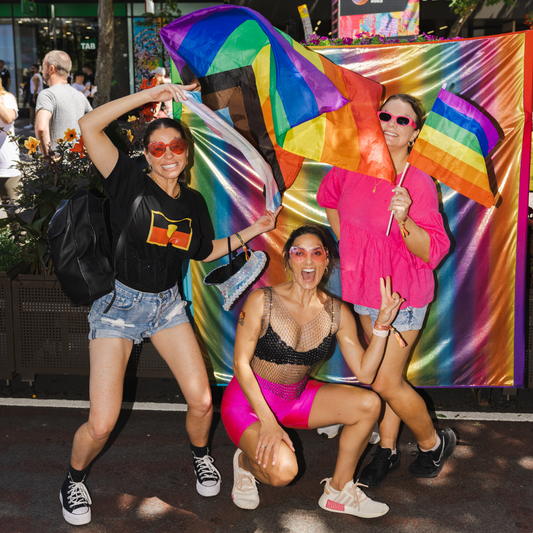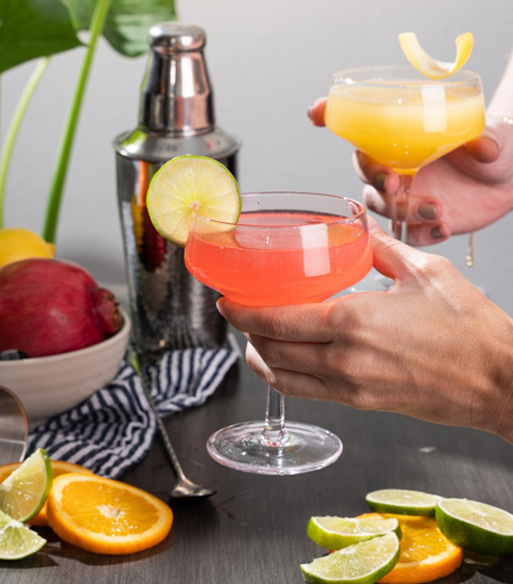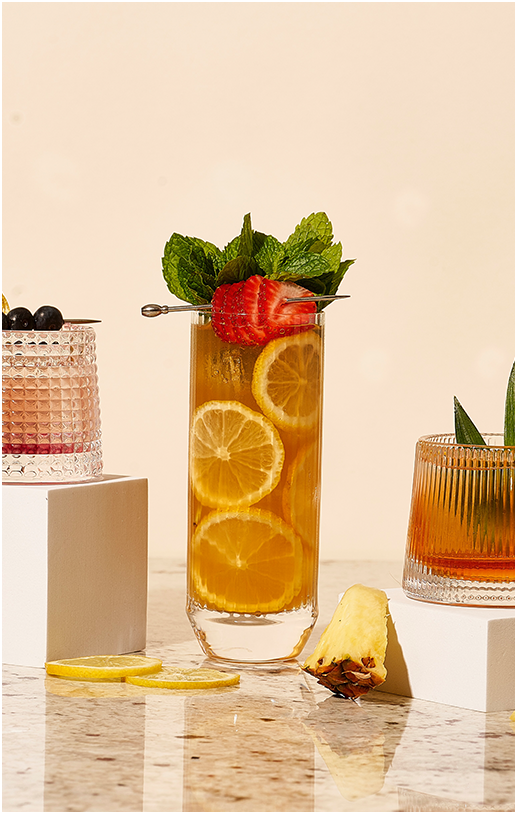All alcohols must go through the distillation process, but what happens after the first round makes them distinct. Spirits, liquors, and liqueurs have a similar production, but slight differences exist. The changes during and after distillation are essential to each alcohol, creating the best and most flavorful mix.
At Sourced Craft Cocktails, we reveal the differences between liquor, liqueur, and spirits to help you find the perfect cocktail drink.
What Is the Difference Between Liquor, Liqueur, and Spirits
Liquor and liqueur are often used interchangeably by mistake, but they are two distinct types of alcohol. Liqueurs tend to be sweeter than liquor because of the added sugars. However, all alcohols are considered spirits after being distilled.
Spirit vs. Liquor
Spirits and liquor are terms used interchangeably often since there is little difference. All alcohols that go through distillation are spirits, such as liquor and liqueur. Spirits can be flavored without adding sweetener, so spirits are not as sweet as liquor.
Liquor, also known as hard liquor, is an alcoholic drink produced by the distillation of grains, vegetables, fruits, or sugars and has been through alcoholic fermentation. The result is the base for cocktails. Distillation heightens the ethyl alcohol to make spirits become liquor. Distillation separates water and alcohol through a steaming process, and alcohol drains through a pipe into another tower to go through a second distillation process. The alcohol by volume increases through multiple distillation processes, creating higher proofs of liquors.
Because of the distillation process, spirits tend to be bitter. Flavors, such as cinnamon, are added after the distillation process to create a variety of liquors. There are three standard ways to enjoy liquor: a base for cocktails, on the rocks, or as a shot. Liquors include vodka, tequila, gin, rum, whiskey, and brandy.
Each type of liquor is made with its ingredients to create unique flavors:
- Vodka: potatoes and cereal grains
- Tequila: blue agave plant
- Gin: grain mash and juniper berries
- Rum: honey, sugarcane, or molasses
- Whiskey: grain mash such as corn, rye, barley, and wheat
- Brandy: wine
Liquor vs. Liqueur
Liqueurs are flavored liquor and were first produced by monks or alchemists. Liqueurs were referred to as crèmes, elixirs, balms, and oils and were part of medicinal practices or used as aphrodisiacs. Today liqueurs are used as an after-dinner treat and aid in digestion or used in cooking. Liqueurs may be taken as a shot, mixed in with a cocktail, over ice, or mixed in with coffees.
Liqueurs combine fruits or herbs with base liquors and add sugar syrup, and they have a lower alcohol content level than liquors. The sugar syrup consists of two and a half percent of the total beverage and makes cocktails sweeter. Hpnotiq, Armaretto, Goldschlager, Butterscotch Schnapps, and Jägermeister are examples of liqueurs.
Drinks That Use Liquor, Liqueur, and Spirits
The Tanqueray Blueberry Gin Tea cocktail is made with homemade blueberry syrup, Earl Grey flavors, and of course, Tanqueray Gin. The blueberry flavor draws you into the refreshing feel of Spring and Summer.
Whether you're celebrating a birthday or just enjoying time with friends, the Baileys Birthday Cake Shot is the perfect sweet cocktail mix. Baileys Original Irish Cream, Vanilla Vodka, Whipped Cream, and Rainbow Sprinkles together create the ideal cocktail to satisfy your sweet tooth.
You can't go wrong with the Bulleit Pineapple Old Fashioned Kit. The homemade pineapple syrup twist on the classic cocktail features delicious Bulleit bourbon, creating a light sweet taste for the warmer months.
The Berries and Cream cocktail prompts the perfect welcome to Spring and Summer with the mix of Bailey's Irish Cream and Chambord to provide a delicious, refreshing taste.
The Zacapa Imperial Fizz incorporates fresh-squeezed pineapple and lime juices and high-quality Zacapa No. 23 and soda water to make this a year-round favorite.
Variety of Flavors of Each
Vodkas included in our kits vary between Smirnoff Original and Ketel One Vodka. These create a tasty cocktail mix and can be combined with other alcohols. Ketel One takes pride in using 100% GMO-free wheat grown in Europe, while Smirnoff is filtered five times through a charcoal filtration process.
Patrón, Espolòn, Don Julio, and Casamigos offer a variety of cocktails for tequila lovers. Each brand offers a variety of aged tequilas. As aging occurs, the flavor of tequila changes. Patrón has no additives and uses the traditional two-ton volcanic stone Tahona wheel and a roller mill to crush the piña, creating a unique flavor. Espolòn offers a dynamic tequila with vanilla bean, pepper, pineapple, agave, lemon zest, and tropical fruit. Don Julio is adaptable for most cocktail drinks with its crisp agave and citrus flavors. Casamigos also offers mezcal that gives drinks a smoky flavoring due to its production process of cooking the agave in an earthly pit.
Tanqueray London Dry Gin creates a fresh taste of earthy and tartness. London Dry has nine different botanicals featured and is the original recipe for gins. The brand has over 200 years of experience distilling gin.
Aged 7,545 feet above sea level for 6-23 years, Zacapa Rum is sweeter and smoother than most other rums. Zacapa No. 23 Rum offers sweet and savory flavors that are sure to please both experienced and amateur cocktail admirers.
Scotland-made Johnnie Walker Black Label whiskey is aged for a minimum of 12 years. Fruit and toffee come together to produce a sweet, spicy, and smoky mix. The Johnnie Walker scotch cocktail mixes provide refreshing combinations.
Our bourbon and whiskey cocktail mixes have a wide variety of choices. Bulleit Bourbon and Crown Royal create cocktail mixes for all seasons. Bulleit Bourbon provides a spicy flavor by using high rye recipe and is mixed toffee flavor straight from Kentucky. Crown Royal delivers a fruity, vanilla, and oak flavored whiskey. Crown Royal Regal built their brand to gift the King and Queen of England. The King and Queen of England fell in love with the flavor and brought Crown Royal back with them. Not long after, it spread in popularity.
How Each Is Made
After liquors are made, an additional step is needed to turn them into liqueurs. Liquors provide the base for all liqueurs, therefore creating a variety of flavors for each type of alcohol. The production may be more specific for certain liquors, such as tequila, but the majority of them are created with the same steps.
Liquors
The production of liquors is similar for each type. Fruits or starchy carbohydrates are crushed or milled to extract sugars and liquids. Common fruits include grapes, apples, or peaches, while common starchy carbohydrates include corn, rye, or barley. As fruits or starches are being milled, they are heated or cooled simultaneously to help with the extraction process. After the milling process, the sugars create a 14 to 18-proof alcohol.
After the milling process, fermentation begins. With 8,000 strains of yeast currently classified, with only about ten being pure, each liquor uses its type. The yeast and sugars convert to create ethyl alcohol from yeast enzymes. Fermentation occurs in stainless steel vats that have temperature control. Fermentation lasts as little as 48 hours to as high as 96 hours.
Once the fermentation process is completed, distillation begins. A pot still located in a vessel is heated through the steaming process, which helps separate water from alcohol. Once the alcohol separates, it feeds into a pipe to a second still, and it repeats the process for one final round.
Liquors can be aged or unaged. Vodka, most gins, some rums, and brandies are unaged, while whiskeys, most rums, and brandies are aged. Aged liquors are placed in wood barrels, often oak, to mature. Whiskey must be stored for two years in the United States, but no other restrictions are placed on other pure liquors. The restriction on storage varies by country.
Liqueurs
After liquors go through production, they may become liqueurs through an infusion process. Soaking fruit in liquors create liqueurs, which allows the absorption of aroma, flavor, and color. Distillation is another form of infusion to create liqueurs. Immersing leaves, seeds, roots, or herbs into the liquor makes a flavorful liquor. After the liquor has wholly absorbed all flavor, it is sweetened. Liqueurs may be aged or bottled immediately.
Whether you're hosting a business event or want to enjoy a cocktail at home, Sourced Craft Cocktails has you covered. You don't have to return anything to our company. For any questions about the ordering process, visit our FAQs page.
 Delivery to:
Delivery to: 









